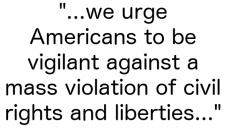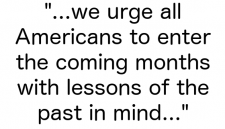Collective Statement by U.S. History Scholars on Civil Rights and Liberties in Dangerous Times Petition
As scholars of United States history, we have experienced concern and alarm as we went from a divisive campaign season to the election of Donald Trump as our president-elect. On the eve of a new administration whose key players have traded in hateful rhetoric and emboldened the harassment of various targets, we urge Americans to be vigilant against a mass violation of civil rights and liberties that could result if such troubling developments continue unchecked. Looking back on World War II and the Cold War, we recognize how easily the rights of people have been suspended during times of great uncertainty. A key lesson of such ordeals has been to never again repeat these mistakes, and so we issue a call to recognize and act upon the critical links between historical knowledge, informed citizenship, and the protection of civil and human rights.
 During World War II, in the wake of Japan’s attack on Pearl Harbor, U.S. officials justified the imprisonment of 120,000 Japanese Americans–U.S. and foreign born, most of whom were U.S. citizens–with the argument of “military necessity.” In the ensuing early Cold War era, the McCarthyist “witch hunts,” House Un-American Activities Committee (HUAC) investigations, and registry of communists and their sympathizers destroyed the lives of countless teachers, artists, politicians, and others.
During World War II, in the wake of Japan’s attack on Pearl Harbor, U.S. officials justified the imprisonment of 120,000 Japanese Americans–U.S. and foreign born, most of whom were U.S. citizens–with the argument of “military necessity.” In the ensuing early Cold War era, the McCarthyist “witch hunts,” House Un-American Activities Committee (HUAC) investigations, and registry of communists and their sympathizers destroyed the lives of countless teachers, artists, politicians, and others.
These historical persecutions have since been widely repudiated by scholars and elected leaders. For instance, the 1988 Civil Liberties Act signed by President Reagan and passed by a bipartisan Congress acknowledged internment as a mistake fueled by racism. It stated, “The internment of the individuals of Japanese ancestry was caused by racial prejudice, war hysteria, and a failure of political leadership.” The Cold War witch hunts associated with Joseph McCarthy were roundly denounced by Republicans and Democrats during the 1954 Army-McCarthy Senate hearings. Decades of research, debate, and analysis have brought historians to a consensus that episodes like internment and McCarthyism were misguided and immoral, and should never be repeated.
 Internationally the United States has been engaged in a war on terror, and domestically the election made clear that we are in an ideological “culture war.” And while we find ourselves in a distinct moment compared to World War II and the Cold War, we are seeing the return of familiar calls against perceived enemies. Alarmingly, justifications for a Muslim registry have cited Japanese American imprisonment during World War II as a credible precedent, and the Professor Watchlist—which speciously identifies “un-patriotic professors”–is eerily similar to the communist registry of the McCarthy era. Looking back to history provides copious lessons on what is at stake when we allow hysteria and untruths to trample people’s rights. We know the consequences, and it is possible, with vigilance and a clear eye on history, to prevent tragedy before it is too late.
Internationally the United States has been engaged in a war on terror, and domestically the election made clear that we are in an ideological “culture war.” And while we find ourselves in a distinct moment compared to World War II and the Cold War, we are seeing the return of familiar calls against perceived enemies. Alarmingly, justifications for a Muslim registry have cited Japanese American imprisonment during World War II as a credible precedent, and the Professor Watchlist—which speciously identifies “un-patriotic professors”–is eerily similar to the communist registry of the McCarthy era. Looking back to history provides copious lessons on what is at stake when we allow hysteria and untruths to trample people’s rights. We know the consequences, and it is possible, with vigilance and a clear eye on history, to prevent tragedy before it is too late.
It is not just that we are at the cusp of what may be a massive rollback of civil rights and liberties, but our culture is also mired in confusion about facts vs. misinformation and a rebellion against knowledge and critical thinking. This makes our present moment doubly dangerous. Though we cannot know for certain what is ahead, we urge all Americans to enter the coming months with lessons of the past in mind, and to draw upon them to stand up for the protection of all people’s civil rights and liberties.
We sign this statement as individual scholars of history. Institutions are listed for identification purposes only.
Review and sign the petition here
